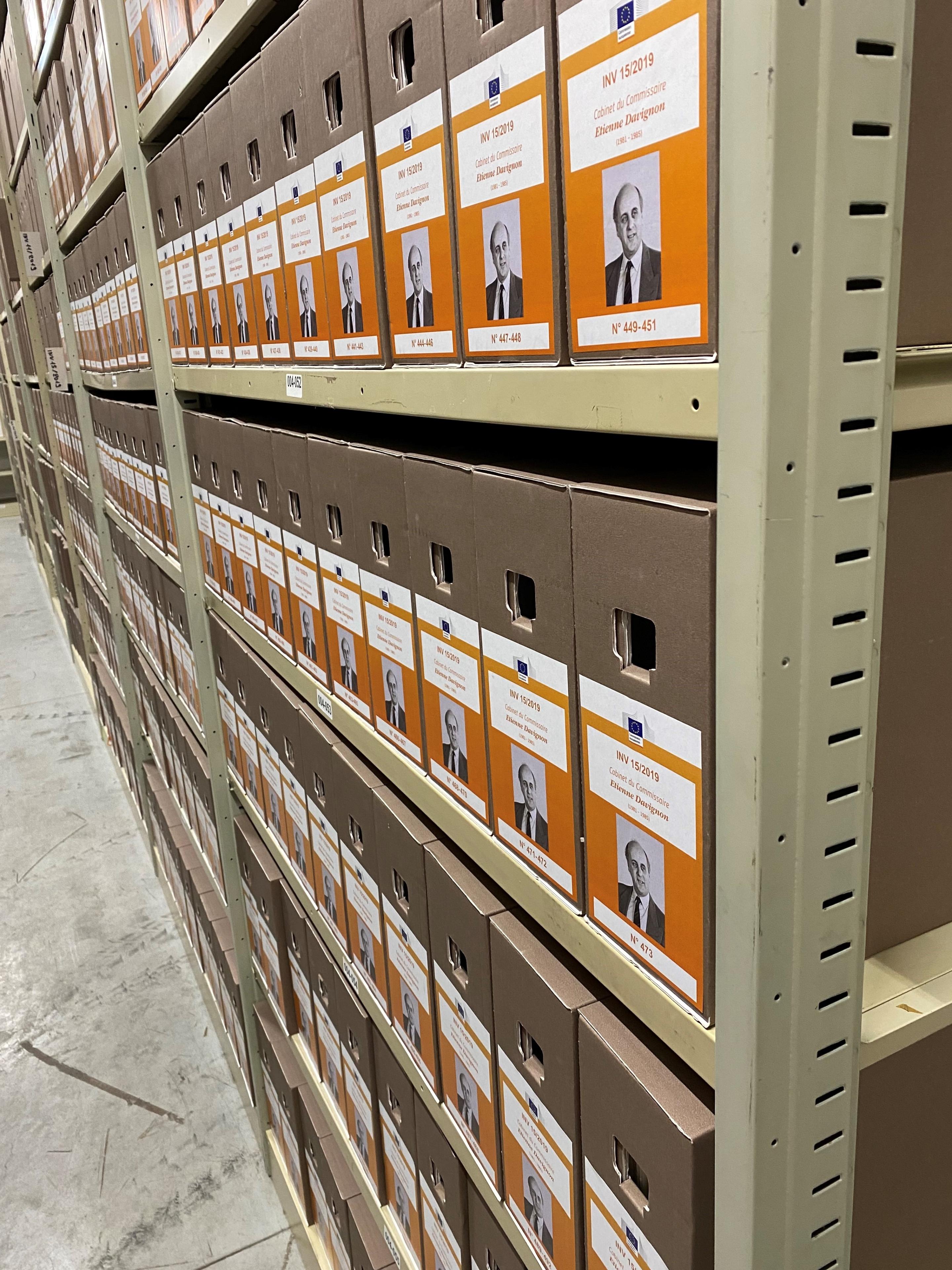Mission Statement
The Historical Archives Service is the bridge between the Commission on the one hand and the research community and the public on the other hand. This is shown by the diversity of its users: staff from the Commission and the Institutions, as well as national authorities, academics, journalists, lawyers, etc.
The requests made by researchers are varied: some want one specific document, others need numerous files to enable them to carry out extensive research. This service can be considered the guardian of the European Commission’s documentary heritage and therefore makes a vital contribution to building the future of the European Union.
Archiving process
- selecting files with a historical, legal or administrative value for permanent retention;
- removing files that have reached the end of their administrative or legal retention period and which do not have historical value;
- making public, where appropriate, documents marked classified when they were created;
- conducting a historical analysis of the files retained to facilitate searches;
- ensuring the long-term storage of files (technical processing and production of digital copies to facilitate back-up);
- lastly, transferring the original files to the final depository, located at the Historical Archives of the European Union (HAEU) in Florence.
Which documents are available?
Documents over 30 years old:
- Under EU law, archives more than 30 years old are open to public access. They can be consulted in the Historical Archives Service and are usually on microfiche.
Documents less than 30 years old:
- Documents less than 30 years old can be open to public access (under EU regulation No 1049/2001 - public access to documents). For more information, go to the European Commission openness and access to documents page or email the Commission's Secretariat-General.
Restrictions to access:
- Some documents transferred to the Historical Archives Service remain inaccessible to the public: classified documents (restricted, confidential, secret, top secret) which can only be disclosed once they have been declassified and documents containing sensitive information (personal data, business data, etc.). These documents remain inaccessible as long as the exceptions to their disclosure last (articles 2 and 3 of EU Regulation 1700/2003).
Archival fonds
ECSC High Authority (1952-67)
The archives of the High Authority of the European Coal and Steel Community (ECSC) contain documents from its:
- horizontal services (General secretariat, Legal service);
- administrative and financial services;
- specialised departments for coal, steel, energy, social policy and transport.
Paper inventories of ECSC High Authority files.
EEC Commission (1958-67)
The archives of the Commission of the European Economic Community (EEC) include:
- administrative and technical matters (reports and opinions);
- trade relations with countries outside the Community (in particular the United Kingdom and the United States): GATT, Dillon Round, Kennedy Round
- negociations in light of the first enlargements;
- customs association and union between the common market and overseas countries and territories and others;
- development and implementation of common policies: agriculture, trade, transport, etc.
Euratom Commission (1958-67)
The archives of the Commission of the European Atomic Energy Community (Euratom) cover:
- promotion of research and dissemination of technical knowledge
- development and application of common safety standards for health protection
- investments to develop nuclear energy
- monitoring the use of nuclear materials
- negotiations and agreements with third countries on nuclear cooperation and supply of nuclear material and inspections in member countries.
European Commission (since 1967)
In 1967, the ECSC, EEC and Euratom executives were merged into a single Commission, commonly known since the Treaty of Maastricht as "European Commission".
The archives are organised according to field of activity and cover:
- negotiations with individual countries on joining the EU (and the outcome)
- relations with non-member countries
- development and implementation of common policies: agriculture, regional development, transport, research, etc.
Collections
Minutes of meetings
Including the weekly meetings of:
- ECSC High Authority (1953-67)
- EEC Commission (1958-67)
- Euratom Commission (1958-67)
- European Commission (since 1967)
- Committee of Permanent Representatives (Coreper, 1958-77).
Minutes can be accessed in accordance with the 30-year rule in the reading room and online.
COM and SEC files
Collection of COM and SEC files produced by the Registry of the Executive Secretariat of the Commission of the European Economic Community from 1958 to 1967 and of the General Secretariat of the Commission of the European Communities from 1967 to 1986.
COM documents are most often legislative proposals, but they may also consist of reports, communications to the Council and/or other institutions, white or green papers, etc.
The COM and SEC file compiles the different versions of a text, allowing to follow its drafting process, as well as its different linguistic versions.
Speeches
Speeches made since 1952 by presidents, commissioners, commission officials, members of the European parliament and other figures. The speeches can be consulted in the reading room.
For speeches pronounced since 1985, see the RAPID database and the Commissioners' websites.
Other document collections
The following documents are open to the public in our reading room:
- Annual General Reports, which give an overall picture of EU activities
- ECSC (1952-67)
- EEC (1958-67)
- Euratom (1958-1967)
- European Communities, later European Union (1967-2005).
Recent EU General Reports are available online.
- Subject-specific annexes to the General Reports (social policy, agriculture, competition, etc.)
- EU Bulletin, chronicling the main activities of the EU's various institutions (ECSC, EEC, Communities). Bulletins from after 1996 are available online.
- Commission organisational charts and the official directory of the EU. See also the Commission directory.
- Studies commissioned by the Commission and stored in the Historical Archives Service until 1st July 2012 (access on request only).
Searching the archives
Searching our archival collections can be done either online or in our reading room.

